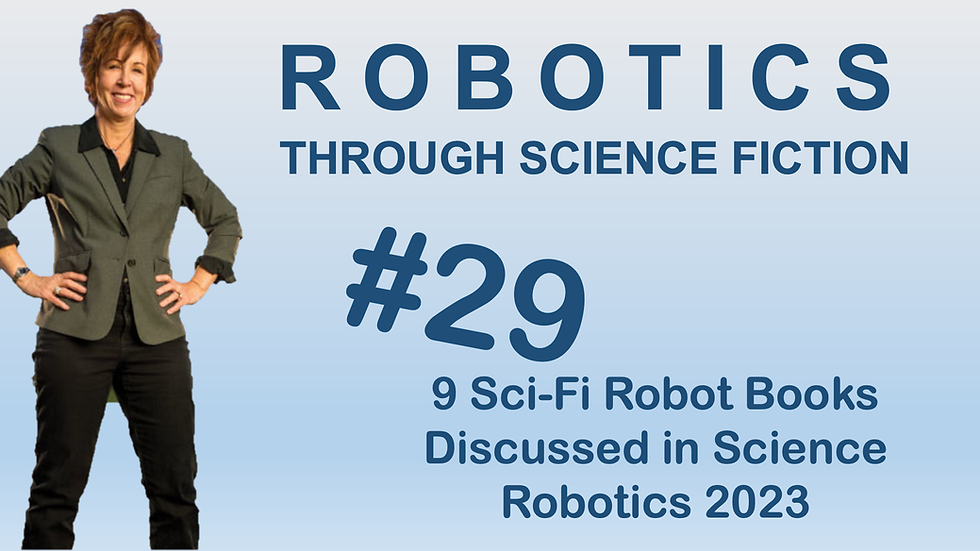Nine scifi books from Science Robotics that show how AI and robots really work
- Admin

- Feb 4, 2024
- 3 min read
Curious about robotics but don't want to read a textbook? See the scifi books that the journal Science Robotics read in 2023 and how they explain concepts like autonomy, brain-machine interfaces, and gender in robots.
I reviewed 9 books (and 2 movies) for Science Robotics this year, not counting Asimov’s oeuvre which I have nearly memorized at this point in my life. Most were released before 2023— many of my articles were about whatever the special issue topic was for that month, if there was one. In those cases, I tried to find the most illuminating scifi and often re-read books. The rest were what I had stumbled across and thought had teachable moments, I read 15 more books on robots for the first time, many of which were terrible or had approximately zero scientific validity. An exception on both counts was the latest Murderbot Diaries, System Collapse; it is terrific and will be the subject of this month’s Science Robotics column. You can see the Science Robotics articles behind the paywall here.
Here are my recommendations:
The Strange (Balingrud) and Machine Man (Barry) were amazing, out of left field with not-by-the-book plots. The Strange was suspenseful, Machine Man was deviously funny. Balingrud and Barry are major talents. See the articles on bounded rationality and brain-machine interfaces.
Sea of Rust (C. Robert Cargill) is like action-movie comfort food, where you’re settling down with popcorn to thoroughly enjoy a Mad Max movie. See the article on social robotics and the emotions of regret and remorse.
Three Miles Down (Harry Turtledove) is like a good, funny stand alone episode of the X-Files, an only slightly counterfactual version of the Hughes Gloomier Explorer and the Nixon administrator. See the article on manipulators and deep see robotics.
Piano Player (Vonnegut) was a “holy cow, he nailed it” in 1952 with his first book. Clearly the guy was a talent from Day One. Put on the Propellerheads “History Repeating” and read it while thinking about Bill Gates and the Bohemian Grove crowd. See the article on automation.
Africa Risen, the new anthology, was mostly fantasy short stories, only 3 robot stories, but all stories were very good. The collection portrayed different cultures from Africa and theAfrican Diaspora, and only one was in the annoying “hectoring” mode that a lot of scifi has become. See the article on transhumanism.
Zed (Joanna Kavenna) was absolutely ROFL, Terry Gilliam brilliant for the first half, then wandered off- it’s worth reading but you may put it down before the end. Really gets to the Gordian Knot that is machine learning.
Andromeda Evolution was a good authorized sequel by Daniel H. Wilson, who has a PhD in roboticist, with good hard science. Like Crichton, not so good on characters and subtle plot points. If you haven’t read Wilson’s work, his Robopocalypse is hard science, action, fun, and evocative- you’d want to start there.
Autonomous (Annalee Newitz) was thorny, provocative, disturbing, sexual, smart. I recommend it but it is heavy and serious. Not a slog, but not a joyride either. See the article on gender in robotics.
Asimov is, of course, a different type of comfort food, like watching a sweet sitcom. See the article on the Three Laws of Robotics. The Complete Robot is a comprehensive colliection. Speaking of which, let me put in a shameless plug for my Learn AI and Human-Robot Interaction through Asimov’s I, Robot Stories here.


Comments